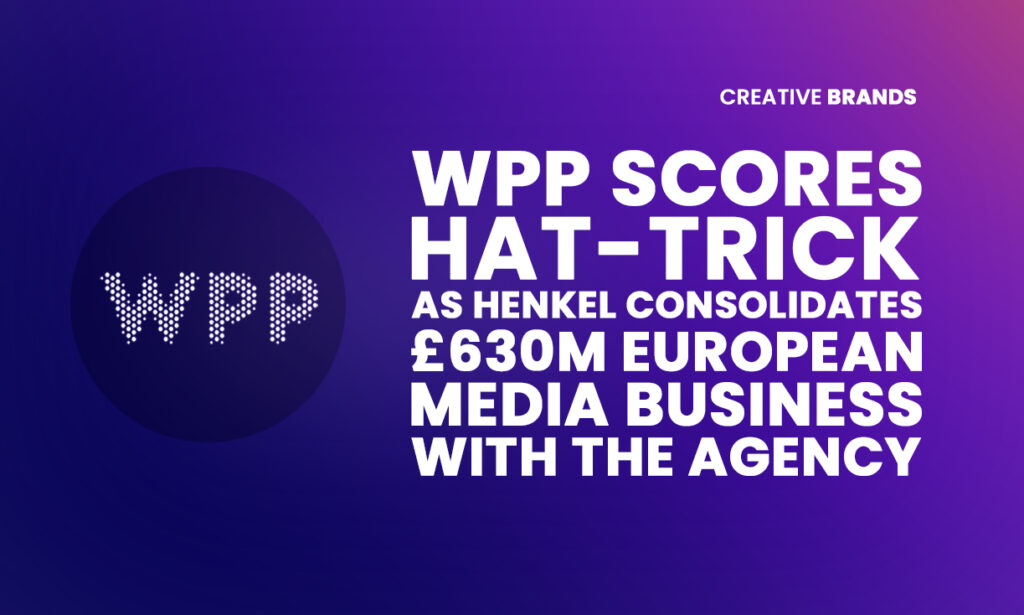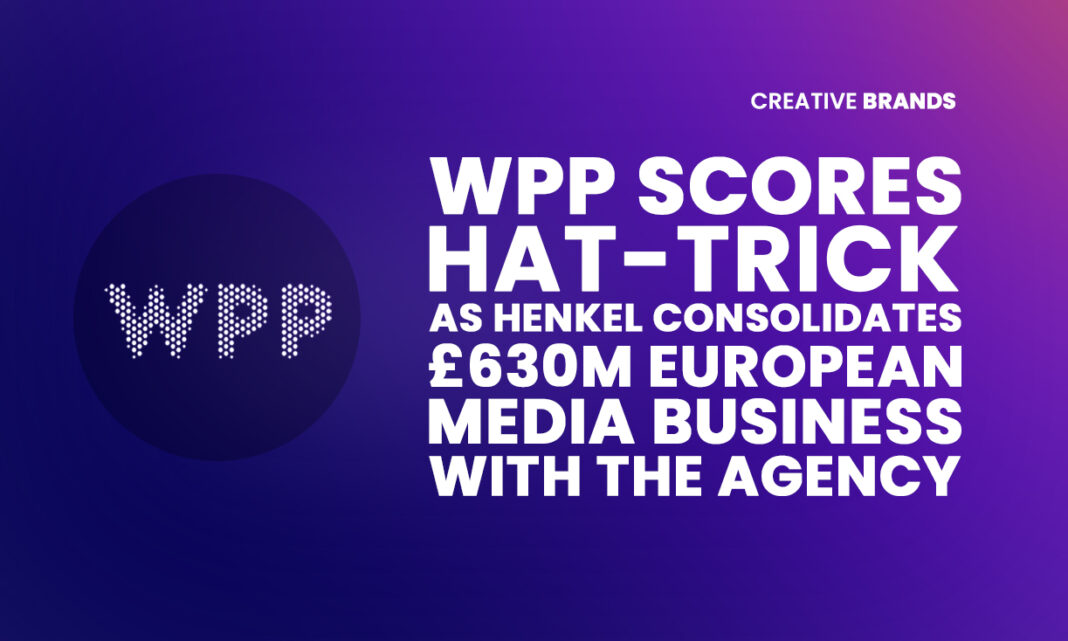WPP has secured its third major win in three months, with Henkel consolidating its £630 million European media account under WPP Media. The move follows recent victories with Reckitt and Mastercard, strengthening WPP’s position as a global media powerhouse as major brands shift toward integrated, data-driven, continent-wide media strategies.

WPP has once again demonstrated its momentum in the global media landscape, securing its third major win in as many months with consumer goods powerhouse Henkel consolidating its entire European media business under WPP Media. The German multinational, whose brands include household names such as Persil, Schwarzkopf and Syoss, has shifted a £630 million account into WPP’s hands, cementing the agency group’s position as a dominant force in the region’s media operations. The move marks a significant moment not just for WPP but for the broader media industry, highlighting how major companies are increasingly seeking unified, data-driven, and strategically aligned partnerships at scale.
Henkel’s decision to consolidate across Europe is being viewed as a logical next step in an increasingly complex media environment where consumer behaviour is shifting rapidly. With fragmented attention spans, multiple digital touchpoints, and heightened expectations for personalised communication, global brands are finding it necessary to streamline their media efforts under agencies equipped with both technological sophistication and geographic breadth. WPP’s integrated infrastructure and emphasis on cross-market coordination appear to have been decisive advantages in the pitch process, particularly as Henkel navigates a post-pandemic marketplace defined by accelerated digital consumption.
This European consolidation adds to a streak of high-profile wins for WPP Media in just three months. In October, Reckitt—owner of brands such as Durex, Nurofen, Strepsils, Gaviscon and Veet—selected WPP Media as its agency of record in Europe. This transition followed a competitive pitch and signalled a major vote of confidence from one of the world’s leading consumer goods companies. Reckitt’s portfolio spans both FMCG and health products, sectors that rely heavily on precise, data-backed media planning to reach consumers in highly regulated and culturally diverse markets. By choosing WPP Media, Reckitt effectively endorsed the agency’s ability to balance creative scale with regulatory sensitivity and operational discipline.
A month before that, WPP captured yet another global giant: Mastercard. The financial services corporation announced WPP Media will lead its global media strategy, planning and buying, further expanding WPP’s influence across multiple continents and industries. Mastercard’s decision was also accompanied by Ogilvy—another WPP subsidiary—being appointed as the company’s global social agency partner. This dual appointment showcased WPP’s depth, offering Mastercard an integrated model across both media and social content, platforms that are increasingly intertwined in the digital-first consumer ecosystem.
Together, the wins from Mastercard, Reckitt and now Henkel have created a narrative of sustained momentum for WPP Media, which has been vocal in recent years about its push toward simplification, technology-led planning and creative excellence. These victories also underscore the broader trend of clients gravitating toward agency groups capable of offering end-to-end capabilities—from creative ideation to cross-channel execution, analytics and measurement. As multinational corporations face increasing pressure to demonstrate efficiency, ROI and brand consistency, the consolidation of media responsibilities under a single agency group provides both strategic clarity and operational coherence.
For Henkel, the shift to WPP Media can be seen as a strategic alignment with a partner capable of providing seamless integration of insights, content and execution across multiple markets. Europe remains one of Henkel’s most significant regions, with highly competitive categories such as beauty, personal care and home care. The ability to deploy unified media planning across the continent could help the company respond more nimbly to regional trends while ensuring brand consistency across 30+ markets. WPP’s technological stack, which emphasises audience insight, automation and predictive modelling, may also prove advantageous as Henkel navigates increasingly digital retail environments and consumers who move fluidly between online and offline shopping.
Reckitt’s earlier move to WPP Media adds context to this recent win, reflecting a continued consolidation trend among large FMCG brands. These companies operate in saturated markets where brand loyalty is often fragile and influenced by digital conversation, health trends and economic sentiment. For them, the value of a powerful, unified media partner lies not only in achieving cost efficiencies but also in unlocking faster test-and-learn cycles, improving message relevance and optimising omnichannel presence. WPP’s ability to combine creativity with measurable performance appears to be a strong selling point.
Meanwhile, Mastercard’s global appointment shows that WPP’s capabilities resonate not just with consumer goods companies but with financial services brands aiming for global brand resonance. As a company operating across more than 200 countries and territories, Mastercard requires a media approach that is both deeply local and robustly global—a balance that WPP’s network model is designed to deliver. The additional appointment of Ogilvy underscores that Mastercard sees value in holistic brand management, where storytelling and media delivery are developed in tandem rather than in silos.
Industry observers note that the trio of wins not only boosts WPP’s revenue prospects but also enhances the agency’s influence over some of the most heavily invested advertising categories in the world. FMCG, personal care, health, food and financial services each represent massive spending portfolios, and their trust in WPP could inspire confidence among mid-sized brands navigating their own decisions about agency consolidation.
The timing of these wins also speaks to a larger shift in the global advertising ecosystem. As companies emerge from economic disruptions and confront new forms of consumer behaviour, from AI-driven search to retail media networks, the need for cohesive strategy and scale has intensified. Agency groups that can integrate technology, creativity and global coordination have become highly attractive partners. WPP’s transformation efforts—centred on simplification, group-wide collaboration and investment in proprietary tech—appear to be yielding visible results.
As WPP Media celebrates a remarkable three-month winning streak, the industry is watching closely to see whether this momentum will continue into the next quarter. The consolidation of large, complex accounts indicates not just new business wins but deeper client trust in WPP’s long-term strategic vision. For the brands themselves—Henkel, Reckitt, Mastercard—the shift reflects a recalibration of how multinational corporations want to operate in an era defined by data, digital acceleration and global connectivity.
In a sector where competition is fierce and margins tight, WPP’s latest victories reaffirm the significance of scale, integration and adaptability. With Henkel’s £630 million European media business now added to its portfolio, the agency group stands poised to influence consumer communications across some of the most recognisable brands in Europe. And with back-to-back wins from Reckitt and Mastercard, WPP has demonstrated not only its competitive strength but its ability to consistently capture the confidence of some of the world’s biggest advertisers.
For now, WPP’s hat-trick of wins is more than a collection of successful pitches—it is a signal to the industry that the agency giant is entering a new phase of assertive, strategic growth, reshaping the media landscape one major account at a time.







